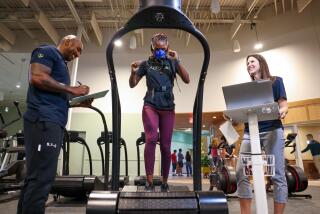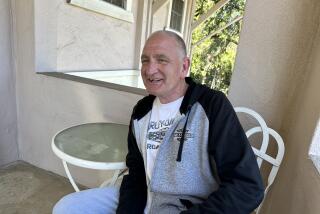For many employees, fitness has its prize
- Share via
Megan from marketing got two televisions, a DVD player, an Xbox 360 and two iPods. Vicki from training got a digital camera, a GPS navigation system and a Bose speaker dock with her iPod. Ben and So Youn, the couple from the lab, got a 42-inch flat-screen TV for their living room.
And the list goes on for workers at Ottawa Dental Laboratory outside Chicago. Their health plan gives them “bucks” for getting in shape, quitting smoking, lowering their cholesterol or managing chronic conditions such as diabetes or asthma. They use the bucks to get merchandise on the health plan’s website -- items including luxury watches, barbecue grills and mountain bikes.
“The shopping is great,” said Vicki Stacey, 53, who earns her bucks by, among other things, exercising at least four times a week. And “I feel real good,” she said. “I have more energy.”
Exasperated by ever-rising healthcare costs and frustrated that conventional health plans fail to promote good health, a growing number of U.S. employers and their insurers are enticing workers to stay healthy with prizes, discounted insurance and even cash.
What began a few years back with a gift card here and a coupon there is evolving into a much more comprehensive effort by companies, health benefits experts said.
At IBM Corp., employees get as much as $300 a year for exercising regularly, quitting smoking or logging on to the company’s preventive-care website.
Blue Shield of California, which insures 300,000 of the state’s public workers, began offering them as much as $200 this year for things like filling out a health-risk assessment form and exercising.
Banking giant Wells Fargo & Co. deposits as much as $500 a year into medical savings accounts for workers with chronic conditions such as diabetes who follow recommended diet, exercise and drug regimens. Wells Fargo’s health plan provider, UnitedHealth Group Inc., one of the nation’s largest, said it was rolling out similar incentives to more than 2 million of its members this year.
Workers say these approaches give them the added motivation they need to drop a few pounds or quit smoking. Employers say these methods should pay off on the bottom line too, because healthier workers have less absenteeism and are more productive.
Whether these tactics will decrease healthcare costs in the long run remains to be seen, experts said. If the benefits are too rich, they may end up costing more than they save. Too little or unsustained and workers will eventually lose interest. But the rewards are getting workers’ attention, at least.
At Johnson & Johnson, employees get a $500 discount on their health insurance if they participate in the company’s disease prevention program, which includes filling out a form to identify possible health risks. Before the incentive, about a quarter of employees filled out the form. Now more than 90% do.
Some say the practices may end up rewarding those who are already healthy while doing little to reduce costs for the sick.
“Many of the people who take you up on this are people who were going to do it anyway,” said Gary Claxton, a researcher with the Kaiser Family Foundation, a healthcare think tank.
But proponents say the change is worth trying because the current medical system isn’t working. Americans are getting less healthy while health costs keep rising.
With the country’s medical bill expected to reach $4 trillion and consume a fifth of economic output in a decade, prevention is more urgent than ever, nearly everyone in the healthcare debate agrees. Gov. Arnold Schwarzenegger recently proposed making prevention programs mandatory for health plans sold in California.
Health maintenance organizations, which proliferated in the late 1980s partly on hopes they would promote wellness, have done little to boost disease prevention because most are about controlling costs rather than managing care, some experts say.
Conventional health insurance isn’t doing the trick either, experts said. Co-payments and deductibles have gone up across the board, but not enough to affect behavior, experts said. Most consumers do not equate their bad habits with higher healthcare costs, because bad behavior takes years to take a toll while out-of-pocket costs are felt immediately and perceived as something arbitrarily imposed by insurance companies.
Moreover, raising out-of-pocket costs too much can have the effect of making already sick patients skip needed care, which only worsens their condition and the ultimate cost of their medical care.
“Currently, there is no incentive for people to behave any differently,” said Steve Burd, chief executive of supermarket chain Safeway Inc. and a vocal proponent of making workers more accountable for their health and healthcare costs.
Two years ago Safeway, the parent of Vons and Pavilions, introduced a health plan to its nonunion workers that fully covers preventive care such as cancer screenings and smoking cessation programs, while penalizing smokers with a $758 surcharge in annual premiums.
Other employers have cracked down on smoking as well. A number of companies now refuse to hire smokers.
Garden-products company Scotts Miracle-Gro Co. made headlines recently after firing a new hire in Massachusetts who failed the company’s nicotine test.
Scotts, headquartered in Marysville, Ohio, offers employees free access to dietitians and fitness coaches and gives other incentives such as $120 for filling out health assessment forms. But it has little tolerance for smokers. Longtime employees who smoke are being offered cessation programs, but if they fail to quit they could lose their jobs.
“We’ve made tens of millions of dollars of investments to provide tools to our workers so they can take control of their lives,” Scotts spokesman Jim King said. “If someone says they are not interested, we reserve the right to say, ‘Neither are we.’ ”
At Ottawa Dental Laboratory, the reward-based health plan has transformed the culture, workers said.
The 110 employees of the lab, which makes crowns and dentures, are a cross section of the American workforce: Some are lanky and tall, some are stout, and most carry some extra weight around the waist. A few smoke.
But things are slowly changing. Posters in the lab’s break room show workers participating in walkathons and fitness competitions. There are fewer doughnut trays, the employees said, and more fruit plates.
Most individual changes are less than radical. Queta Nave, 42, a lab technician, said she had begun doing stretches at home and walking more. She’s lost 8 pounds in six months.
“We have to take some of the responsibility,” Nave said. “You can’t expect a doctor to fix something that took you 20 years to screw up.”
Every little bit helps, said Art Carlos, CEO of Destiny Health Insurance Co., Ottawa’s insurance provider.
Like those of other programs, Destiny’s rewards are based on verifiable results and not only on what members report about their activities. Fitness levels, for example, are tested twice yearly and include endurance and flexibility tests. Workers’ blood pressure and cholesterol levels are also measured regularly, and ex-smokers must submit blood samples to test for nicotine.
Destiny also partnered with a national chain, Life Time Fitness. Every time a Life Time member who is also insured by Destiny checks into the gym, the information is automatically passed on to the health plan.
More than half of Ottawa Laboratory’s workers have won significant prizes, even with modest behavior changes.
“We are not hoping to turn people into Olympic athletes,” Carlos said. “It is about changing behavior.”
Ottawa Laboratory workers are healthier overall, said Joanie Bretag, the company’s head of human resources.
Because of privacy laws, Bretag can’t probe into the health status of her workers, but she knows from the company’s wellness program that several have lost weight and some have quit smoking, and many workers have told her their blood pressure is down.
The workers filled 160 fewer drug prescriptions last year than the year before. “The co-pays have stayed the same,” Bretag said, “so we know it is not because people are skimping on their medicines over costs. They are actually healthier.”
Ottawa Laboratory’s chief operating officer, Joe Jennings, is 53 and smoked most of his life. His staying nicotine-free for a year, combined with bucks he earned for walkathons and other wellness activities, was good enough for him to get top-of-the-line speakers for his living room and his pool, a computer printer and discounts at luxury resorts.
“I used to find an excuse to smoke,” Jennings said. “The reward gave me an excuse to stop.”
More to Read
Inside the business of entertainment
The Wide Shot brings you news, analysis and insights on everything from streaming wars to production — and what it all means for the future.
You may occasionally receive promotional content from the Los Angeles Times.










